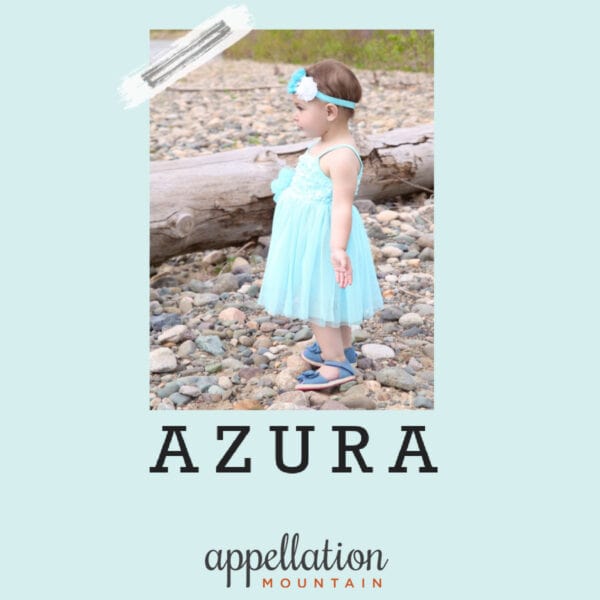
Thanks to Sarah Winter for suggesting our Baby Name of the Day, and Alyssa for requesting an update.
JOHN
John the Evangelist and John the Baptist both feature prominently in the New Testament. The name traces its roots to the Hebrew Yochanan – God is gracious. It occurs across the world, in an astonishing number of forms and translations, almost certainly thanks to the two prominent saints. And it’s wildly popular, among the most common of given names across centuries, even continents.
So how do we go from saintly name to St. John as a name?
ON THE MAP
Consult an atlas, and suddenly St. John is everywhere.
Places with the name appear in the UK, US, Canada, and the Caribbean. So do San Juan and plenty of other forms.
Some of the earliest bearers may have been Norman invaders who came to England with William the Conqueror. In that case, they were from places named Saint-Jean in France. There remain plenty of possible Saint-Jeans today.
And so it became a surname, just like Saint Clair or Saint Anne or Saint James, to name just a few, eventually led to surnames.
About 19,000 people in the US today have the surname, many of whom probably have an ancestor who traces his roots to some place on the map named for one of the many saints John.
But it gets even more complicated from here.
SINJIN
This name is not necessarily pronounced like the words Saint John.
In England, it’s almost certainly said sin jin. If that seems bananas, remember that Sinclair evolved from St. Clair, Santiago from St. James, and Santana from St. Ann. We’re forever mashing things up, simplifying the sounds, and generally confusing future generations.
VERY BRITISH
The name often signifies that the bearer is very British, indeed, and perhaps a little bit grand, too.
In Four Weddings and a Funeral, the priest butchers the groom’s name in Wedding Two:
Priest: why I, Bernard Godfrey SAINT JOHN Delaney …
Groom: why I, Bernard Geoffrey SINJIN Delaney ….
There’s also A View to a Kill, the 1985 James Bond adventure. When Bond goes undercover at a high end horse auction, he uses the alias James St. John Smith, correcting the pronunciation in an oh-so-English fashion.
But long before pop culture amused itself with the name, Sinjin was the real deal.
A handful of aristocratic Englishmen use the name or the title, like Anthony St. John, 22nd Baron St. John of Bletso. It’s liberally scattered through this 1985 birth announcements round-up from British Baby Names. And many of us may first encounter it on a Jane Eyre character, St. John Rivers.
RARER THAN RARE
Despite all of these associations, historic and pop culture-drenched alike, it has never almost been used as a boys’ name in the US.
Of course, it’s tough to find in the data. Spell it St. John, and the US Social Security Administration will probably record it as simply St. Stjohn is another option, as are all of the phonetic spellings: Sinjin, Sinjun, and Sinjon.
Sinjin peaked in 1992 and 1994, with a record high of 25 births. The other two spellings are virtually unused.
A handful of notables might be familiar. There’s writer, adviser, and explorer St. John Philby, who was involved in negotiations between the US, UK, and Saudi Arabia following the discovery of oil in the region. On a very different note, St. John Smith retired from professional beach volleyball after helping to establish the sport in the Olympics. (Yes, he pronounces his name Sinjin.)
And for years, a horror movie starring Roddy Piper – the retired pro wrestler – has been in the works. It’s titled Sin-Jin, with Piper starring as a prisoner named Sin-Jin Smyth. (The director insists it’s not a nod to the James Bond alias.) But after a 2009 planned release date came and went, it seems unlikely to see a big screen release.
From 2010 to 2013, Victoria Justice starred on Nickelodeon teen sitcom Victorious. We met her Hollywood Arts High School classmate, Sinjin Van Cleef. So that could have introduced the name to a new generation.
BRITISH BOY
Americans tend to use this name as a quirky outlier, and there’s plenty of reason to hear it that way. But it has history aplenty, and a sort of British sensibility that can read as rather handsome. If you’re all about Basil and Albert and Rupert and more names on Tatler’s posh list, I can see St. John working better than any of us might expect.
First published on March 30, 2009, this post was revised substantially and re-posted on January 16, 2020.





And then there is my brother who is Synjun (1988) a rendition of how my parents imagined it was spelled from the show Airwolf, as someone else mentioned above. Pronounced Singin/Sinjin
I’m laughing at all the comments hating on this name! I just used it for my baby! My husband and father in law are both named John, the oldest grandson is Jonathan, so I wanted a John name but a little different.
Veronica, I’m so glad you used this name! It’s just fascinating. Can I ask if you’re pronouncing it Sinjin or Saint John?
We are pronouncing it Sinjin, but wait! There’s more. I’ve always wanted a Jack, and through watching Stargate SG1, I discovered that Jack is a nickname for John names (Colonel Jack O’Neil is actually Jonathan) so baby’s nickname is Jack.
Oops, sorry for the bump. I did not realize the original thread was almost a decade old–it was just top of the landing page. Feel free to delete both of mine/let them die in moderation!
No worries – I did just polish up the post + re-share it. And I’m VERY glad to have that info. It rings the faintest bell, and I’m sure you’re right about the mid-80s St. John uptick. Fascinating – thank you!
In the old show Airwolf, from the late 80s, the main character (Stringfellow Hawke) is searching for his MIA brother, St. John (pronounced Sinjin). Might explain why the name would peak in the US just a handful of years later.
I think St John is probably still decently popular in the aristocracy/ old landed gentry circles (if nothing else as a middle name), however outside of country houses and literature (mostly that written in the Victorian era) it is unheard of in most of the UK unless it happens to be as a surname